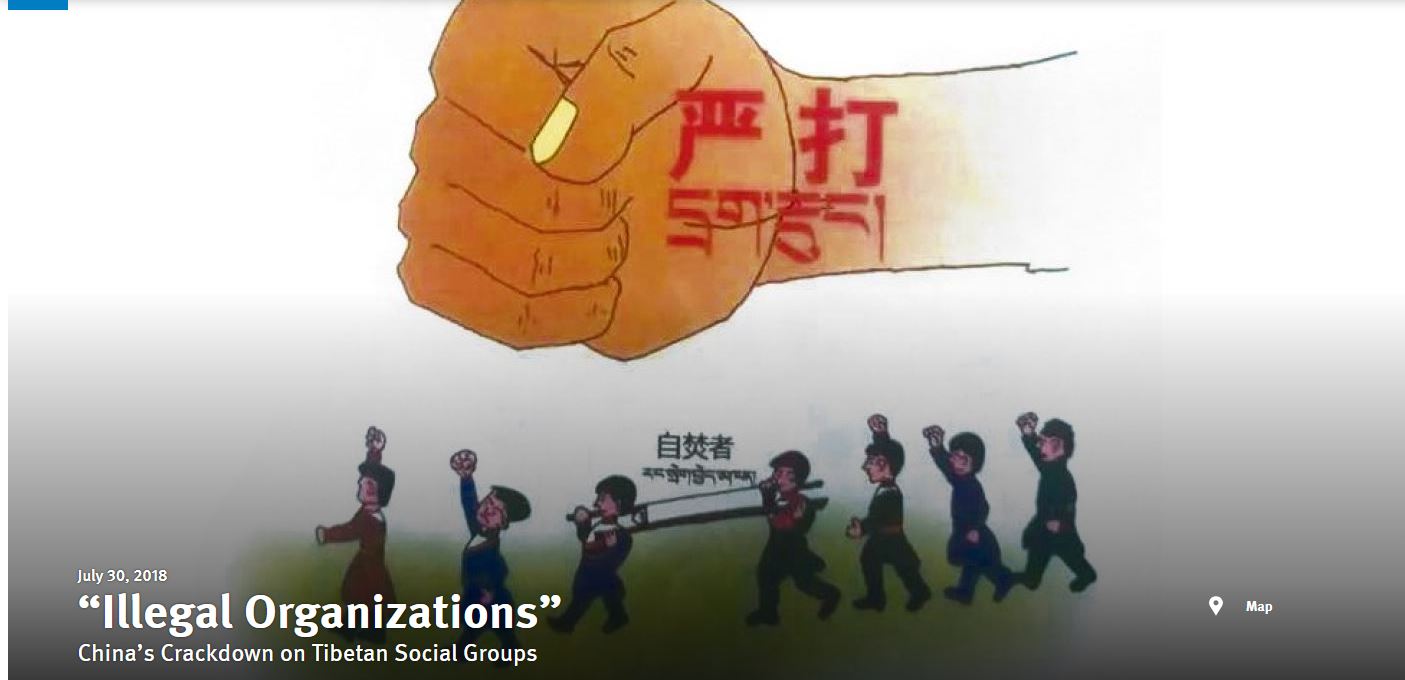New York, US — The communist regime in China has even criminalised expressions of support for Middle Way Policy which seeks genuine autonomy for all Tibetans living in the three traditional provinces of Tibet, the international non-governmental organization Human Rights Watch (HRW), a New York-based rights organisation said in a report released on July 30, 2018.
The police notice also described any expression of support for the Dalai Lama’s proposal for increased autonomy in Tibet as a form of organized crime. To our knowledge, this is the first time such activities and opinions have been officially listed as crimes by a provincial-level body in Tibet.
The 101-page report, “‘Illegal Organizations’: China’s Crackdown on Tibetan Social Groups,” details efforts by the Chinese Communist Party at the local level to eliminate the remaining influence of lamas and traditional leaders within Tibetan communities. The report features rare in-depth interviews, state media cartoons depicting the new restrictions, and cases of Tibetans arbitrarily detained for their involvement in community activities.
The so-called Tibet Autonomous Region (TAR) Security Bureau published a revised list of definitions of “organised crimes” in February, including “instilling in the masses reactionary ideas such as the ‘middle way’, a reference to the Dalai Lama’s proposal to resolve the China-Tibet conflict through negotiations leading to increased autonomy in Tibet instead of calling for independence.
The New York-based rights organization said that Advocacy or speech about “protecting the ‘mother tongue,’” meaning calls for the greater use of Tibetan language in society, is also listed as a form of organized crime and is now prohibited, the report said, adding: The criminalization of this issue in the TAR police notice appears to refer primarily to private conversations or messages about threats to Tibetan language rather than to public activities such as demonstrations.
The HRW said that the new restrictions aim to strengthen the power of the Chinese Communist Party at a grassroots level, by eradicating the influence of traditional Tibetan leaders and lamas. The authoritarian regime in Beijing has said that the measures are necessary to prevent “separatist” movements and to cut off support for the Dalai Lama.
The newly-issued Security Bureau notice promised citizens anonymity if they reported “crimes by underworld forces” or “gang crimes” to the police, HRW’s 101-page report said. Another notice issued in the Tibetan city of Nagqu offered a 100,000 Yuan (HK$114,993) reward for tip-offs about any of the listed activities, which include challenging China’s territorial claims over Tibet, raising funds for the “Dalai clique,” and advocacy for the greater use of the Tibetan language. Additionally, traditional Tibetan welfare associations – known as “kyidu” – are now reportedly considered illegal.
Section of a cartoon published by China’s Malho Prefecture Government in a handbook around 2015 to illustrate the “Twenty Illegal Acts of a Tibet Independence Nature.” The cartoon, a criticism of anti-government protests in Tibet, shows a fist that reads “strike hard” and a corpse marked “self-immolator” to depict illegal act No. 4: “Carrying corpses in public processions, gathering crowds, and creating a spectacle and so on in collective protest, and disrupting social stability.” According to the handbook, “such acts must be smashed.”
China has been a member of the United Nations since 1945 and is a signatory of its 1948 Universal Declaration of Human Rights, whose provisions aim to protect the human rights of all people in participating nations. But HRW said that these new regulations are evidence of China’s systematic violation of human rights in Tibetan areas. “Beijing repeatedly claims that Tibetans have autonomy and their rights as an ethnic minority are respected,” said China director of Human Rights Watch Sophie Richardson. “But the realities show only increasing repression of Tibetans’ daily lives and basic human rights.”
The Tibetan Government in-Exile says "The "Middle-Way" Approach, proposed by His Holiness the Dalai Lama to peacefully resolve the issue of Tibet and to bring about stability and co-existence between the Tibetan and Chinese peoples based on equality and mutual co-operation."
It also says the Tibetan people do not accept the present status of Tibet under the People's Republic of China. At the same time, they do not seek independence for Tibet, which is a historical fact. Treading a middle path in between these two lies the policy and means to achieve a genuine autonomy for all Tibetans living in the three traditional provinces of Tibet within the framework of the People's Republic of China.
The government in-Exile believes the Middle-Way Approach, a non-partisan and moderate position that safeguards the vital interests of all concerned parties-for Tibetans: the protection and preservation of their culture, religion and national identity; for the Chinese: the security and territorial integrity of the motherland; and for neighbours and other third parties: peaceful borders and international relations.
The Chinese Communist regime began their invasion of Tibet in 1949, reaching complete occupation of the country in 1959. Since that time, more than 1.2 million people, 20% of the nation's population of six million, have died as a direct result of China's invasion and occupation. In addition, over 99% of Tibet's six thousand religious monasteries, temples, and shrines, have been looted or decimated resulting in the destruction of hundreds of thousands of sacred Buddhist scriptures.
Human Rights Watch is an international human rights monitoring and advocacy organization known for its in-depth investigations, its incisive and timely reporting, its innovative and high-profile advocacy campaigns, and its success in changing the human rights-related policies and practices of influential governments and international institutions.


![Tibet has a rich history as a sovereign nation until the 1950s when it was invaded by China. [Photo: File]](/images/stories/Pics-2024/March/Tibet-Nation-1940s.jpg#joomlaImage://local-images/stories/Pics-2024/March/Tibet-Nation-1940s.jpg?width=1489&height=878)


















